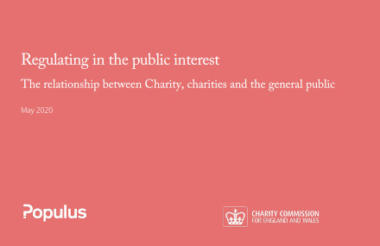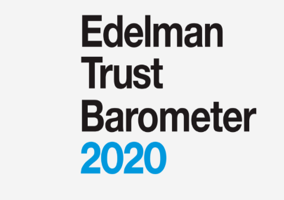The Charity Commission has published the latest research commissioned from Populus into public expectations of charities. They’ve stopped calling it research into public trust in charities, possibly (am I being too cynical?) because the research shows that trust in charities has risen to 6.2 out of 10, beating the ordinary man or woman in the street, whose victory over charities was made much of by the Commission in the past.
Charities are trusted more than banks, private companies, social services, local councils, newspapers and, bumping along the bottom, MPs and government ministers. This doesn’t feature in the Commission’s headlines. They want to shape a different narrative about charities’ failure to live up to public expectations. In various ways, the report is loaded in favour of that narrative.
Some key omissions and alterations
As well as analysing data from a recent sample of over 4,000, the report seeks to draw together previous research findings from this series, so it’s instructive to note what’s been omitted. For example: that most of the public associate charities with about nine big household names; have very little knowledge of which other organisations are charities and which are not; are unaware of entire large categories of charities. Why? These findings don’t fit the Commission’s narrative that public expectations of charities are the paramount consideration for charities and the regulator.
The claim that the public believes charities must aim at distinct and higher standards of behaviour than other sectors of society also hasn’t made the cut. I speculate that this is an implicit admission: the Commission’s previous research never did show this, and they should not have claimed it did – so this omission is positive.
There’s also an explicit and helpful acknowledgement this time that “public opinion is not monolithic” and they show how opinions differ on some issues between four segments of society, from metropolitan Guardian readers in the top left to Sun readers in the bottom right.
Data about public expectations doesn’t match the Commission’s messaging
The main emphasis of the report is on the expectations that all segments of the public are found to hold in common.
The runaway winner, with 79% support, is that a high proportion of charities’ money should go to those they are trying to help (also paraphrased in the report as charitable activity).
Way behind, at around 50%, “the second most important expectation across the map of the (sic) public opinion is that charities are making the impact they purport to”. So, the public thinks that resources should be devoted to the cause and its beneficiaries and that it should make a real difference to them. All quite conventional, and nothing we don’t already know from previous evidence.
But here’s a strange thing: in the summary on the Commission’s website accompanying the report, and in the identical Introduction, these two winning expectations are omitted, in favour of three other less popular expectations which have more to do with behaviour and the duty to uphold the reputation of charity generally – the Commission’s preferred narrative. Am I being cynical again?
The third most popular expectation, also at around 50 per cent, is that “the way our charity goes about fulfilling its charitable purpose is as important as whether it fulfils that purpose or not”. This is framed in contrast to how the same sample regarded businesses, which on this evidence the public expect to be determinedly and even ruthlessly focused on specific results and commercial criteria.
Caring for a sick child or cancer patient (a typical public image of a charity) is obviously different from selling hamburgers: how you do it is all mixed up with what you are trying to achieve. Crucially, however, the report does not explore whether the same expectation would apply to an NHS nurse, or a social worker, or your local community policeman, so we don’t know whether this expectation is specific to charities or to all those whom the public assumes are in a caring profession.
It seems wrong that the authors later paraphrase this third expectation, quoted above, as the public’s expectation “That the way they go about making that impact is consistent with the spirit of 'charity'”. Where have we heard this phrase before? It’s a favourite but controversial expression of the Charity Commission leadership, but it wasn’t put in front of the research sample at all. It’s not what they voted for.
Leading questions
The fourth most common expectation is that all charities should feel a collective responsibility to uphold the reputation of charity (sic) more generally. Again, this finding is elevated in the Commission’s messaging – but there are two problems with it.
First, it was put to the sample in a loaded, falsely binary way. Respondents were invited to choose between the following:
- “Your only responsibility is to uphold the reputation of your own organisation” [sounds selfish and inward-looking, doesn’t it?]
- “If you enjoy the benefits of that status, you have a collective responsibility to uphold the reputation of charity more generally” [implies: surely you do?]
Worded like that, can there be any surprise at the outcome (20:63 in favour of the second)?
Second, there’s no exploration of the relative importance of this collective responsibility. What if the principal duties of the charity are to do your utmost for your beneficiaries, to which you should devote the major part of your energies and concentration, but you should also recognise an accountability to the wider public? One wonders what the result would have been if the sample had been invited to rank a few of the different duties of trustees, including the collective responsibility among the rest? Perhaps it doesn’t serve the Commission’s preferred narrative to put that aspect of trusteeship in a relative perspective?
Asking a sample of people, a large majority of whom know virtually nothing about the Charity Commission or who never even heard of it, what the Commission’s role should be, has been a recurrent, to some slightly comical, feature of these reports, which means it’s impossible to put too much weight on the results.
In this case, the report is vitiated by another loaded, leading question, with respondents asked to choose between these two propositions:
- “The charity regulator should confine its role to making sure charities stick to the letter of the laws that govern charitable activity” [sounds narrow and pedantic]
- “The charity regulator should try to make sure charities fulfil their wider responsibilities to society as well as sticking to the letter of the law” [sounds responsible and balanced, away with pedantry!].
It’s no surprise that the public vote for the latter even though none of the critics of the Commission’s current narrative actually are arguing the former point. It’s a false binary, designed to support a broad regulatory remit with a big focus on behaviour rather than legality.
Conclusion: Not a moment of glory for the Commission or their research partner
Sadly yet again, all is not well when it comes to the Charity Commission’s relationship with data and evidence, and how the leadership uses data to buttress its wider strategy and public narrative. Previous research findings that might weaken the desired narrative have been omitted. The Introduction and summary cherry-pick the report accordingly. The relative weight of findings about trustees’ responsibilities is not properly assessed. Some questions put to respondents are leading and poorly framed. This is not a moment of glory for the Commission or their research partner, Populus.
Related articles










